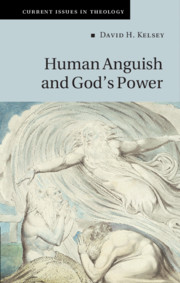‘The central message of Human Anguish and God's Power is intensely practical, reminding Christians that when they seek to speak of God in the face of suffering, they can only stammer. Yet in exploring the reasons for this stammering - the impossibility of synthesizing into a single account the different ways in which God works to bless us - David Kelsey manages something very close to a dogmatics in miniature, ranging across the full sweep of God's creative, reconciling and redeeming work with a combination of pastoral and theological sensitivity that shows how even stammering can give powerful witness to God's glory.'
Ian A. McFarland - Robert W. Woodruff Professor of Theology, Emory University
‘In these pages, the distinguished theologian David Kelsey explores God's power, with an eye to sensitive pastoral concern for believers who struggle in the face of tragic suffering. Exposing all the false ways that cultural notions of “useful” force are projected onto the traditional notion of divine power, Kelsey commends an understanding of providence as the glory of God's sovereignty manifested in three, interrelated biblical plots that reveal how the power of the Trinitarian God is actualized in God's own divine life and in God's relation to creation. Kelsey insightfully argues that scripture's diverse rendering of providential power sets the proper context for reflection on God's efficacy toward suffering, and the directions he charts will inform theological discussion for many years to come.'
John E. Thiel - Fairfield University
‘… a measured, thoroughly theological (both traditional, doctrinal, and biblical) approach to the question of suffering.’
Kirsten Sanders
Source: Henry Center For Theological Understanding
'… a robust work of doctrinal and biblical theology that offers a well-reasoned and compelling conception of divine power that moves beyond the notion of control and toward the notion of God’s wise companionship and care.'
Declan Kelly
Source: Studies in Christian Ethics
‘Human Anguish and God’s Power provides an interesting study of theological method in addition to the basic argument of the book. Kelsey’s approach to using the tools and ways of the systematic theologian to address one of the deep surds which enfolds pastoral theology is fascinating.’
Stephen Ray
Source: Scottish Journal of Theology
'Human Anguish and God’s Power is a compassionate and demanding book that combines both a deep concern with 'human anguish' over suffering and an extraordinarily careful theology reconceiving 'God’s power.''
James J. Buckley
Source: Modern Theology
‘Much exists within the covers of this book to digest. Though it bears significant implications for reshaped pastoral counsel in response to human suffering, it is an academically demanding monograph, as one would expect from this respected series … his proposal merits serious future engagement in the doctrinal categories of God’s providence, sovereignty, and theodicy.’
William M. Marsh
Source: Southeastern Theological Review





